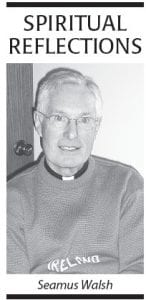The Gospel passage read in the worship services of many of our congregations this weekend was the story of John the Baptist from Luke 3:10-18. When the people came to the Baptist each group asked: “What should we do?”
What caught my attention were two groups, the tax collectors and the soldiers who came to John and asked the same question. John’s response to them amazed me.
We must consider the background. Thesoldiers maintained peace, not for the Jews, but for the Romans who had conquered the country. These Romans were not welcome and they put down any hint of rebellion against Roman rule brutally. And it was somewhat similar for the tax collectors. They collected taxes for a foreign government. That was bad enough, but many of them gouged even more from the beaten-down population to make themselves wealthy.
I would have expected John the Baptist to have told the soldiers, “Take off that uniform and burn it, you can’t be a soldier.”
And to the tax collector, “Stop immediately gathering taxes for the Roman government.”
But John didn’t do so. He told the soldiers to continue being soldiers, adding, “but do not practice extortion, do not falsely accuse anyone, and be satisfied with your wages.”
And to the tax collectors he said they might continue as tax collectors, but: “Stop collecting more than what is prescribed.”
Soldiers and tax collectors were a reality, like war and taxes, and there was nothing the people could do about it.
This was distressing and depressing for me. The words of Jesus that “we must turn the other cheek” and of Martin Luther King, that “violence never brings permanent peace. It solves no social problem. It merely creates new and more complicated ones,” seem foolish and naïve by the Baptist’s advice.
And then in Oslo last week President Obama spoke on the very same issues when he accepted the Nobel Peace Prize. Among other things he said:
“War, in one form or another, appeared with the first man. At the dawn of history, its morality was not questioned; it was simply a fact, like drought or disease – the manner in which tribes and then civilizations sought power and settled their differences…. We must begin by acknowledging the hard truth that we will not eradicate violent conflict in our lifetimes. There will be times when nations – acting individually or in concert – will find the use of force not only necessary but morally justified…. I face the world as it is, and cannot stand idle in the face of threats to the American people. For make no mistake: Evil does exist in the world. A nonviolent movement could not have stopped Hitler’s armies.”
But, he says: “So let us reach for the world that ought to be – that spark of the divine that still stirs within each of our souls…. We can acknowledge that oppression will always be with us, and still strive for justice. We can admit the intractability of deprivation, and still strive for dignity. We can understand that there will be war, and still strive for peace.”
I suppose I have to adjust to reality too.
Each month a member of the
Cook County Ministerium will
offer Spiritual Reflections. For
December, our contributor is
Father Seamus Walsh of St.
John’s Catholic Church in Grand
Marais and the Holy Rosary
Catholic Church of Grand
Portage.



Leave a Reply